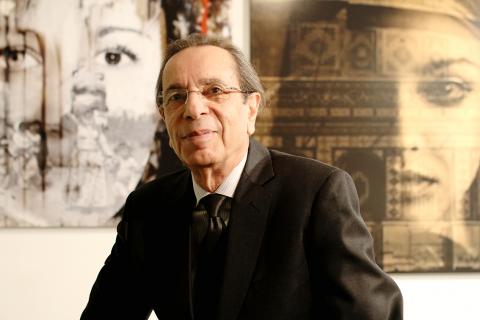Interview with Rabai al-Madhoun, winner of the 2016 International Prize for Arabic Fiction
27/04/2016

In the days preceding the announcement, you took part in a number of events in Abu Dhabi alongside the shortlisted authors. How did you find that experience?
I really enjoyed meeting the other authors: they are a wonderful group who have written wonderful books. Each one of these authors deserved to be a winner. There was mutual understanding and respect for one another, no competition. We talked about who the winner could be; none of us expected to win. It’s not easy to be shortlisted – it’s a huge event in our lives, just being nominated, and we each hoped we would win.
What were you thinking as you walked over to the stage after the announcement was made?
I was waiting in the ceremony, excited, to see which word was going to come out of Amina’s [Chair of Judges] mouth. If she formed a word beginning with ‘M…’ [Masaa’ir/Destinies], I would know my book had won.
It’s amazing to have won, despite the pressure that’s put on you. There are two sides to it - one, a lot of pressure from media et cetera; the other, the glamour of being chosen, your book being selected as the best work of Arabic fiction of the year. It gives you an incredible feeling, all that media attention on your book and knowing it will be printed everywhere.
At the very moment I won, I thought: ‘I did it!’ I’ve been shortlisted before and missed the Prize. It wasn’t easy to be longlisted and shortlisted twice: I’m 70 and I don’t think I’d have another chance to win. It will take another 3-4 years to write my next novel, and who knows if I’ll still be alive. It’s time for it to be a Palestinian winner.
I thought all about the readers who live under occupation; for them this is a great cause for celebration. I am going back to the Palestine book fair in Ramallah on 12 May. I had talked before to one of my friends, the Minister of Culture, and told him: I hope I can come back to Palestine as the winner – this would be a wonderful thing.
All of these things were in my mind at that moment.
Have you celebrated yet or are you waiting until you’re back home?
No, the first real celebration will be when I get back home, with my colleagues from Al Sharq al Awsat. The second, when I go to Ramallah - more important still, for the book fair. But the biggest will be in Haifa, a place which is central to the novel – there’s a lot of expectation about being in Haifa and celebrating there.
What advice would you give a young Palestinian or Arab writer?
Be patient, be creative, don’t use metaphors – use the form. Find your own style, your own narration, and try to think about your reader: how will they enjoy your book? Read a lot of novels and read about novels as well.
